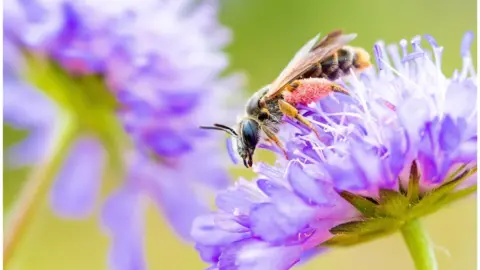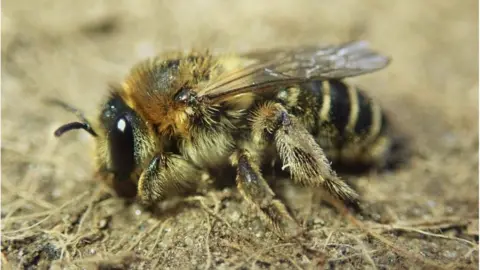New populations of rare bees found in Cornwall
 Will Hawkes
Will HawkesNew populations of two rare bee species have been found in Cornwall.
The large scabious mining bee, previously known in only four areas in the county, has been found at two new sites, one near The Towans, and one near Rock.
Also near the Towans, a new site has been found for the nationally scarce, solitary, red bartsia bee.
Insect expert Paddy Saunders, who found the bees, said he was "really blown away" by the discovery.
'Great hope'
Mr Saunders, an entomologist, said: "The finds were unexpected as on one new site the large scabious mining bee was last recorded almost 40 years ago, and the red bartsia bee has not been recorded at all in Cornwall for almost 20 years."
He said it gave "great hope that it is possible to keep these beautiful creatures in Cornwall".
He discovered them during Buglife's North Cornwall B-Lines project, which has been working with landowners and communities along the north Cornwall coast.
The project has been restoring species-rich grassland to benefit pollinating insects, and to help rare and threatened bee species.
Charity Buglife says that in Britain the large scabious mining bee is a scarce southern species, with its range extending as far north as south Wales to Oxfordshire and the north Norfolk coast.
 Paddy Saunders
Paddy SaundersLaura Larkin, conservation officer at Buglife, said: "We've worked very closely with the National Trust and other local landowners to harvest and sow a fantastic amount of Cornish wildflower seed, which will create some beautiful new wildflower meadows along the north coast."
The large scabious mining bee only collects pollen from field scabious flowers.
Ms Larkin said: "We've also worked with some local nurseries to grow thousands of field scabious plug plants.
"These will be planted out in areas near to existing large scabious mining bee populations, which will increase the amount of habitat available to the bees and help these often fragile bee populations survive into the future.
"The discovery of new populations of one of the projects key bee species and a new species for Cornwall is inspiring and a testament to the project team, partners and communities who have supported our work."

Follow BBC News South West on Twitter, Facebook and Instagram. Send your story ideas to [email protected].
